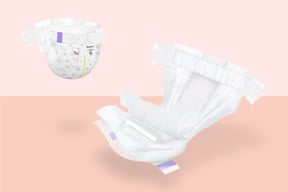What is diaper rash?
Diaper rash mainly occurs when skin has been in prolonged contact with irritants, namely poop and urine, but it could also be from creams or other allergens. Any amount of wetness on your baby’s sensitive skin for a prolonged period of time can cause diaper rash. Although diaper rash can be mild and recovery can happen within a few days, it can make babies uncomfortable and disrupt their sleep. If left untreated, diaper rash can become severe and lead to secondary infections that require prescription treatment.
What does diaper rash look like?
If your baby has a slight or mild diaper rash, there may be some faint pinkness in a small area. The skin may also be dry. If it’s a moderate diaper rash, the skin may appear more inflamed and cover a larger area. There might be swelling or larger bumps. A severe diaper rash will have intense redness, plus lots of swelling and bumps over a large surface area. Your baby might even develop blisters, sores or other secondary infections if left untreated.
Keep in mind your child’s skin tone as well when looking at diaper rash. Says Dr. Peter Lio, MD, a board-certified dermatologist and clinical assistant professor of dermatology and pediatrics at Northwestern University’s Feinberg School of Medicine, “Skin redness is less obvious in darker skin tones and may often appear more violet rather than red.”
Characteristics of diaper rash:
Diaper rash can present itself in a variety of ways, such as on baby’s bottom, perianal region, genitals or inner thighs.

- Slight or Mild Diaper Rash: Faint pinkness covering a very small area, skin dryness
- Moderate Diaper Rash: Skin looks red in a large area, can have smaller areas with more intense redness, some areas may have slight swelling and/or small bumps
- Severe Diaper Rash: Intense redness, swelling/bumps in a large area. May develop blisters, sores, and secondary infections
What causes diaper rash?
Poop: The number one cause of diaper rash is poop. Poop is very irritating to skin, and when it’s left on the skin too long, a rash will occur.
Scientifically speaking, the prolonged exposure on your baby’s skin damages the skin barrier. In turn, that makes the skin not effective at protecting your baby’s most sensitive areas. The irritants in poop and urine also increase the pH, which adds to the discomfort. Frequent bowel movements or diarrhea may also increase it’s pH. Babies can even get yeast infections from soiled diapers as a secondary infection.
Urine: The second leading cause of diaper rash is urine. Did you know that newborns can urinate up to 24 times a day when healthy? That’s a lot of diapers to change! But changing them frequently is important to help reduce urine irritants.
Friction or chafing: Your baby’s skin is still developing during the first year of life, which makes him more susceptible to all sorts irritation. If a diaper is left on too long and is too wet, chafing can occur due to prolonged friction.
Allergens: It might become obvious after a few bouts of diaper rash that you need diapers specially formulated for sensitive skin. Some babies can develop a skin rash from direct contact with certain allergens found in diapers, or even in their food. Any change in diet or medications like antibiotics might also contribute to diaper rash, as their poop consistency and frequency can change due to these factors.
Diet and Medications: Changes in baby’s diet, food allergies and certain medications (such as antibiotics) can affect poop content, consistency and frequency, increasing the susceptibility for irritation in the diaper area.
How do you treat diaper rash?
How do you prevent diaper rash?
- Changing diapers frequently and using diapers designed with gentle materials, breathable outer covers, and superabsorbent materials that can quickly absorb fluid and keep it away from the skin can help promote skin health. All Huggies® diapers are made without harsh ingredients and provide up to 12 hours of leakage. They will keep your baby dry and protected.
- You’ll also want to use properly formulated baby wipes that are pH balanced and that can gently and effectively clean poop and urine from baby’s delicate skin while helping maintain a healthy skin pH. Huggies® wipes are scientifically designed with your baby’s skin in mind.
- Try leaving your baby diaper-free for a while to allow their skin to breathe. This can be a delicate dance considering how often babies pee and poop, but if your baby has just gone to the bathroom, wipe them and give them some diaper-free time.
- Change your baby’s diaper frequently and make sure you are cleaning your baby’s bottom thoroughly. Huggies® wetness indicator will let you know exactly when your baby’s diaper is soiled so you can take action immediately and change them.
When should I call my doctor about diaper rash?
Diaper rash visual guide
Karien Rodriguez, PhD Biomedical Engineering
Debbie Ngai, BS Chemical Engineering
Endorsed by Dr. Peter Lio, MD, FAAD, Board Certified Dermatologist; Clinical Assistant Professor of Dermatology & Pediatrics at Northwestern University Feinberg School of Medicine; Founding Director of the Chicago Integrative Eczema Center.
Browse Huggies® absorbent diapers to find the best one for your baby.
Learn more about the Huggies® Diaper Rash Care Guide coming soon.












